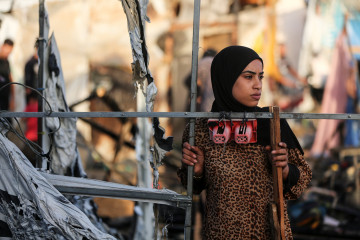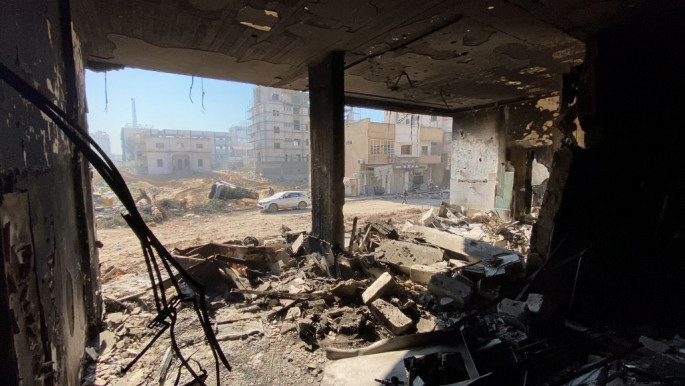

Inside her dilapidated tent in one of the camps for displaced people in the southern Gaza Strip, 37-year-old Nisreen sits on her bed, hugging her two daughters tightly as if it is the last time.
Nisreen's life has been turned upside down since being told by doctors that she only has around two years to live after being diagnosed with stage four breast cancer just a couple of months before Israel's war on Gaza began — the brutal war exacerbating her tragedy.
Nisreen had obtained a medical referral to travel to Egypt to receive treatment. “I was about to travel for treatment, but the war broke out suddenly, without any prior warning,” Nisreen tells The New Arab.
Since then, Nisreen has repeatedly tried to travel outside the Strip, but all her attempts failed until the war forced her to flee from her home in Gaza City to the southern Gaza Strip.
"When we were forced to flee, my husband lost our only source of income, as he worked as a taxi driver. At that time, my two daughters became my priority, so I had to work in sewing to provide for their daily needs," Nisreen added.
Losing hope
In February 2024, Nisreen's health condition worsened and she began to suffer from severe pain, especially in the chest area. At that point, she made the difficult decision to travel for treatment, leaving her two daughters in the care of their father.
"The Egyptian authorities imposed exorbitant travel fees, amounting to five thousand dollars per person," Nisreen explains. "Since we did not have this amount, I decided to sell the gold jewellery I had kept since my marriage."
After she managed to raise the money needed to travel, the unexpected happened: in May 2024, Israeli forces completely closed the Rafah crossing.
“That day was the end of my dream of treatment and recovery,” Nisreen continues sadly. “I cried a lot then, and I felt that I had lost hope of survival.”
Ahmed, Nisreen's 42-year-old husband, tries to cling to hope and deny the bitter reality. He always repeats to his wife that the medical diagnosis that gave her only two years to live was just a mistake and that the doctors had miscalculated, but in reality, he lives in a state of internal fragmentation, besieged by a deep sense of helplessness and despair, unable to save his wife from her harsh fate.
"How did all these calamities come together for us? War, displacement, famine, genocide, and cancer that threaten my wife's life and leave my two daughters on the brink of orphanhood," Ahmed tells The New Arab.
He adds that during a year of war, his family was displaced nine times, each time searching for a new place to set up their tent. "Can you imagine how harsh this situation is for a cancer patient who lacks any care?"
Nisreen's two daughters, 12-year-old Basma and six-year-old Rana do not realise what is happening to their mother but are aware that their mother is not well.
Basma tells The New Arab, “My mother no longer plays with us like before, and I see her crying most of the time. I ask her what makes you cry, mother, and she looks at me and my sister without answering.”
No medicine, no hospitals
In another story, 51-year-old Fatima Abu Zaher lives with similar suffering in the face of breast cancer and repeated displacement.
Fatima was diagnosed three years ago and was able to overcome the danger stage after several treatment trips to Egypt.
But what worries Fatima no is the depletion of medicine for breast cancer patients in the Gaza Strip, in addition to the Israeli army’s destruction of the Turkish-Palestinian Friendship Hospital last year, which is considered the only one in the sector specialising in treating tumours.
Fatima, a mother of seven, added: “During the war, I did not receive any medicine, and I felt my health deteriorate due to the repeated displacement within Gaza City until I began to feel severe sensitivity in my chest due to inhaling dust and smoke from the Israeli bombs that are constantly bombing Gaza.”
She explained that her eldest daughter, Khadija, recently took her to the hospital to have a CT scan of her chest. “I discovered through this examination that I had a new tumour in my chest.”
She continued: “I was shocked by the reality of the treatment for cancer patients. There is no biological treatment or even painkillers, and we do not have a medicine to boost immunity.”
Fatima indicated that the doctor advised her to eat healthy food and fruits regularly, but she explained, “There is no healthy food or even fruits available in the markets. We are living in a real famine in Gaza.”
Unknown fate
Dr Subhi Skeik, the Director General of the Turkish-Palestinian Friendship Hospital, told The New Arab that losing the only hospital specialising in tumours “leaves cancer patients alone to face their unknown fate.”
Dr Skeik reported that 360 cases of breast cancer are diagnosed annually in the Gaza Strip, at a rate of one case being discovered every day.
He explained that breast cancer patients are part of the 10,000 people suffering from various types of cancer in the Gaza Strip, only about 1,500 of whom were able to leave Gaza during the war, while the rest are trapped in Gaza and dire need of treatment abroad.
The doctor also pointed out that the rate of cancer infection among women in the Gaza Strip exceeds that of men, reaching 54%.
With the war raging on, cancer patients are suffering further due to poor shelter conditions, lack of hygiene, and scarcity of healthy food and water, which increases their risk of complications and death.
Dr Sakik describes the medical situation as catastrophic, and said, "There are only two places that provide painkillers for cancer patients in the southern Gaza Strip, including the Nasser Medical Complex in Khan Yunis, and the Al-Razi Clinic in the central region," but he added, "There are no medicines or hospitals that care for cancer patients in the northern Gaza Strip."
Breast cancer patients live in silent suffering amid a state of international indifference. “While the world’s attention is focused on the Palestinians being killed in airstrikes in Gaza, there is a silent but growing wave of cancer patients dying needlessly because they are unable to access treatment,” said Reham Jafari, Communications and Advocacy Officer at ActionAid International, in a statement earlier this year.
She added: “We know that early diagnosis of cancer saves lives, but with Gaza’s healthcare system overwhelmed and people’s immediate focus on their survival, it is likely that hundreds more cases are going undetected and untreated.”
Rasha Jalal is an author and journalist from Gaza who covers political events and humanitarian issues.






 Follow the Middle East's top stories in English at The New Arab on Google News
Follow the Middle East's top stories in English at The New Arab on Google News


